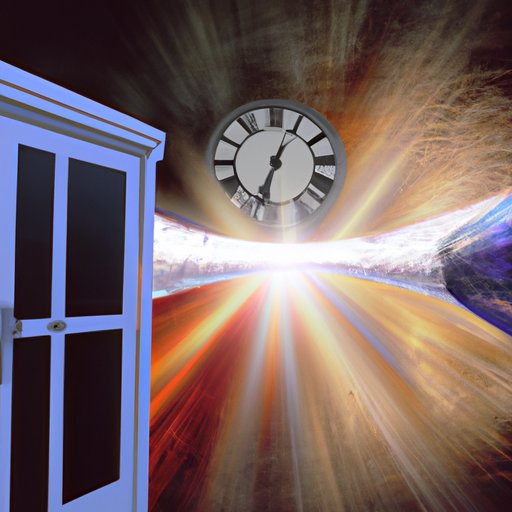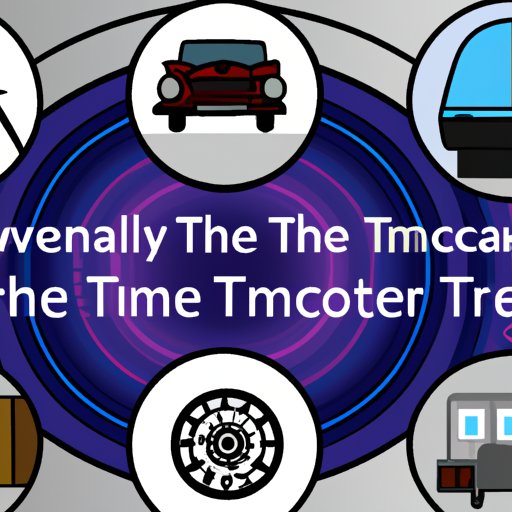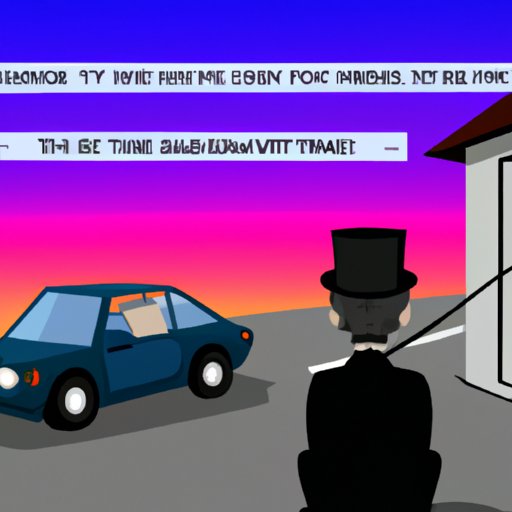Introduction
Time travel has long been a dream of science fiction fans and physicists alike. But what is time travel exactly? The concept of time travel is defined as the hypothetical movement between different points in time, usually with the use of a theoretical device known as a time machine. It is an idea that has captivated humanity for centuries and has inspired countless stories, films, and books.
In this article, we will explore the possibilities of time travel, from examining scientific theories to investigating historical accounts and analyzing its practicality. Let’s take a closer look at how time travel works.

Exploring Scientific Theories on Time Travel
To understand how time travel works, it is important to first look at some of the leading scientific theories on the subject. These theories provide insight into the potential mechanisms behind time travel as well as exploring the possibility of its existence.
Einstein’s Theory of Relativity
The most famous theory of time travel is Einstein’s Theory of Relativity, which states that time is relative and can be affected by the speed at which one travels. According to this theory, if one were to travel at the speed of light, time would slow down for them, allowing them to travel into the future. However, due to the immense speed required to achieve this, it is not currently possible for humans to travel at the speed of light.
Quantum Mechanics and String Theory
Another scientific theory related to time travel is Quantum Mechanics and String Theory. This theory proposes that the universe is made up of tiny vibrating strings of energy, and these strings can interact with one another in ways that affect time. This could theoretically allow for the manipulation of time, although the exact mechanism is still unknown.
Wormholes and Black Holes
Finally, there is the possibility of using black holes and wormholes to travel through time. Black holes are massive objects in space that have such a strong gravitational pull that nothing, not even light, can escape their grasp. Wormholes, on the other hand, are theoretical shortcuts between two points in space-time. It is theorized that a person could use a wormhole to travel through time, although this has yet to be proven.

Examining Popular Time Travel Fiction and its Real Life Implications
Time travel has been a popular theme in fiction for centuries, from ancient mythology to modern films and television shows. Let’s take a look at some of the most popular examples and how they may have impacted our understanding of time travel.
Doctor Who
One of the most iconic examples of time travel fiction is Doctor Who, a British science fiction television show. In this show, the protagonist is able to travel through time and space in his time machine, the TARDIS. This show has been immensely popular over the years and has had a major impact on popular culture, inspiring numerous spin-offs and films.
Back to the Future
Another popular example is the 1985 film Back to the Future. In this movie, a young man named Marty McFly travels back in time using a modified DeLorean car. The film was a huge success and spawned two sequels, cementing the idea of time travel in the minds of millions of viewers around the world.
The Terminator
The 1984 film The Terminator also features time travel, although in a slightly different way. In this movie, a cyborg assassin is sent back in time to kill the mother of the leader of the human resistance. While this movie does not focus on the mechanics of time travel, it does highlight the potential dangers of tampering with the timeline.

Investigating the Paradoxes of Time Travel
When discussing the possibility of time travel, one must also consider the paradoxes that could arise from such a feat. These paradoxes are potentially fatal flaws in the logic of time travel, and they can lead to some interesting questions about the nature of time itself.
Grandfather Paradox
One of the most famous paradoxes is the Grandfather Paradox, which states that if you were to travel back in time and kill your own grandfather before he met your grandmother, then you would never have been born. This paradox highlights the potential consequences of altering the timeline and how it could lead to a logical impasse.
Bootstrap Paradox
The Bootstrap Paradox is another common time travel paradox. This paradox states that if you were to travel back in time and give yourself or someone else an object or piece of knowledge, then where did that object or knowledge come from originally? This paradox is often used to explore the implications of changing the past and the consequences of such actions.
Predestination Paradox
The Predestination Paradox is a variation of the Bootstrap Paradox. This paradox states that if you were to travel back in time and change something in the past, then that change would have already happened in the present. This paradox is often used to explore the implications of predeterminism and the idea that the future is immutable.
Investigating the Possibility of Time Travel Through Technology
While time travel may still be in the realm of science fiction, there are some technologies that could potentially make time travel a reality. Let’s take a look at some of these technologies and how they could be used to achieve time travel.
Wormhole Creation
One of the most promising technologies for achieving time travel is the creation of artificial wormholes. Wormholes are theoretical shortcuts between two points in space-time, and it is theorized that a person could use a wormhole to travel through time. However, creating a stable wormhole is no easy task and requires immense amounts of energy.
Warp Drives
Another potential technology for time travel is the use of warp drives. Warp drives are engines that allow for faster than light travel, and it is theorized that a ship equipped with a warp drive could travel through time. However, this technology is still in its infancy and has yet to be tested in real life.
Quantum Entanglement
Finally, there is the possibility of using quantum entanglement to achieve time travel. Quantum entanglement is a phenomenon in which two particles become linked together, regardless of distance. It is theorized that these particles could be used to create a bridge between two points in time, allowing for time travel. However, this technology is still in its early stages and is far from being realized.

Examining Historical Accounts of Time Travel
Time travel has been a part of human mythology for millennia, with many cultures having their own versions of the concept. Let’s take a look at some of these accounts and how they may have influenced our understanding of time travel.
Ancient Mythology
One of the oldest accounts of time travel comes from ancient mythology. Many cultures, including the Greeks and Romans, had tales of gods and heroes travelling through time. These stories often involved deities or mortals travelling to the past or future to accomplish feats and gain knowledge. These tales likely inspired later works of fiction and may have shaped our modern understanding of time travel.
Religious Texts
Religious texts also contain stories of time travel. For example, in the Bible, the Prophet Elijah is said to have travelled through time to escape death. Other religious texts, such as the Hindu Vedas, also contain stories of time travel, suggesting that the concept has been a part of human belief systems for centuries.
Medieval Writings
Finally, there are medieval writings that discuss the possibility of time travel. For example, the 12th century philosopher and theologian St. Thomas Aquinas wrote about the concept in his Summa Theologica. This work discussed the possibility of time travel and explored the philosophical implications of such a feat.
Analyzing the Practicality of Time Travel
While the possibility of time travel is fascinating, it is important to consider the practical implications of such a feat. From physical limitations to psychological impacts and economic factors, there are many things to consider when discussing the feasibility of time travel.
Physical Limitations
The first limitation is physical. As previously mentioned, travelling at the speed of light is not currently possible, and so time travel in the traditional sense is not achievable. Additionally, creating a stable wormhole or warp drive is incredibly difficult and may not be possible with current technology.
Psychological Impacts
Another consideration is the psychological impacts of time travel. Travelling through time could have a profound effect on the traveller, both mentally and emotionally. Additionally, the effects of altering the timeline could have unforeseen consequences that could be damaging to the traveller and those around them.
Socioeconomic Factors
Finally, there are socioeconomic factors to consider. If time travel were to become a reality, it is likely that only the wealthiest individuals would be able to afford it. This could lead to inequality and further exacerbate existing economic disparities.
Conclusion
Time travel is an intriguing concept that has captivated humanity for centuries. In this article, we have explored the scientific theories, fictional works, paradoxes and practicality of time travel in order to gain a better understanding of how time travel works. While time travel may still be a far off dream, it is clear that it is a possibility that should not be discounted.
Through examining the various theories and accounts of time travel, we can gain insight into the potential mechanisms and implications of such a feat. Additionally, we can begin to appreciate the complex nature of time travel and the many challenges that must be overcome in order for it to become a reality. The possibilities of time travel are truly endless.
Summary of Findings
This article explored how time travel works by examining the scientific theories, popular time travel fiction, paradoxes, technological possibilities, historical accounts and practicality of time travel. It is clear that while time travel may still be a distant dream, the possibilities of it becoming a reality should not be discounted.
Final Thoughts on Time Travel
Time travel is a fascinating concept that has captivated humanity for centuries. While the exact mechanics and implications of time travel are still unknown, it is clear that it is a possibility that should not be overlooked. Whether time travel ever becomes a reality remains to be seen, but it is certainly an exciting prospect.
(Note: Is this article not meeting your expectations? Do you have knowledge or insights to share? Unlock new opportunities and expand your reach by joining our authors team. Click Registration to join us and share your expertise with our readers.)
